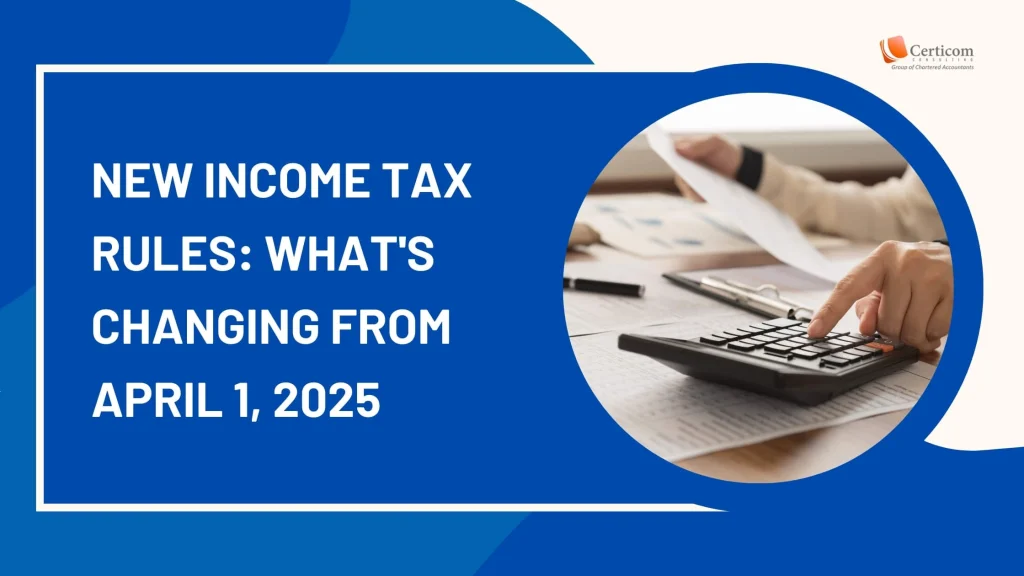New Income Tax Rules: What's Changing from April 1, 2025

The Finance Act 2024 introduces significant amendments to the income tax framework, set to take effect from April 1, 2025. These updates aim to enhance compliance, provide relief to taxpayers, and promote entrepreneurship. Below are the key highlights:
1. Enhanced Startup Benefits (Section 80-IAC)
Startups incorporated until March 31, 2030, will continue to enjoy a 100% tax deduction for three consecutive years within the first ten years of operation. This extension, previously available only until March 31, 2025, underscores the government’s commitment to fostering innovation and entrepreneurship in India.

2. Rationalization of TDS (Tax Deducted at Source)
Several revisions have been made to TDS thresholds to simplify compliance:
TDS on Rent (Section 194-I): The threshold has been raised from an annual limit of ₹2.4 lakh to ₹50,000 per month.
TDS on Interest (Section 194A):
For senior citizens: The exemption limit has increased from ₹50,000 to ₹1 lakh per annum.
For others: Limits now stand at ₹50,000 for banks/cooperatives and ₹10,000 for others.
TDS on Insurance Commission (Section 194D): The threshold has increased from ₹15,000 to ₹20,000.
TDS on Payments to Partners (Section 194T): A newly introduced provision mandates firms/LLPs to deduct 10% TDS on payments exceeding ₹20,000 to partners, including remuneration, interest, and bonuses.
3. Streamlining of TCS (Tax Collected at Source) – Section 206C(1H)
To reduce redundancy in tax collection, TCS will no longer apply to the sale of goods if the buyer has already deducted TDS under Section 194Q. This ensures a streamlined compliance process and eliminates double taxation concerns.
4. Individual Taxpayer Relief
Several benefits have been introduced for individual taxpayers under the new tax regime:
Rebate under Section 87A: The income threshold for availing a rebate has been raised from ₹7 lakh to ₹12 lakh, reducing the tax burden for middle-income earners.
Standard Deduction: The deduction for salaried taxpayers has increased from ₹50,000 to ₹75,000.
Net Impact: These changes effectively make annual income up to ₹12.75 lakh tax-free under the new tax regime.
5. Extended Timeline for Updated Returns (ITR-U) – Section 139(8A)
To encourage voluntary compliance, taxpayers can now file updated returns up to four years from the end of the relevant assessment year, an increase from the previous two-year limit. This offers individuals and businesses more flexibility to rectify past filings and declare additional income.
6. Procedural Reforms and Trust Regulations
Extended Block Assessment Period (Section 158BE): The deadline for completing block assessments has been extended to 12 months from the end of the quarter in which the search or requisition took place, providing more time for thorough scrutiny.
Charitable Trust Registration (Section 12AB): Validity for trust registration has been extended from five years to ten years for trusts with annual income below ₹5 crore.
Revised Definition of “Specified Persons” (Section 13(3)): The new rule limits specified persons to donors contributing more than ₹1 lakh, simplifying compliance requirements for trusts.

7. Introduction of the NPS Vatsalya Scheme (Section 80CCD)
Previously, deductions under Section 80CCD were available only for contributions to an individual’s own NPS account. From April 1, 2025, parents or guardians can claim deductions for contributions made to a minor child’s NPS account under the newly introduced NPS Vatsalya Scheme.
The income tax amendments effective from April 1, 2025, emphasize simplifying compliance, promoting entrepreneurship, and reducing the tax burden on individuals. With higher rebate limits, streamlined TDS/TCS provisions, and extended return filing timelines, the tax regime is becoming more transparent and business-friendly. Taxpayers and businesses should align their financial planning strategies to maximize the benefits of these reforms and ensure timely compliance.
Related Post
Flipkart ESOP Compensation: ₹11 Crore Payout – Salary or Capital Receipt?
Form 16: Key to Accurate ITR Filing
Book A One To One Consultation Now For FREE
How can we help? *




